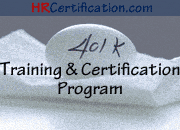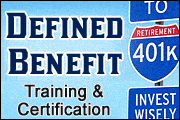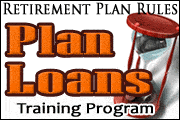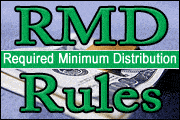Retirement Plan / 401(k) Training
Retirement Plan Training CoursesK
What Does A Retirement Plan Administrator Do?A Retirement Plan Administrator manages the day-to-day affairs of the plan. This includes:

- Working with legal documents
- Determining and/or working with investment options
- Communicating with plan beneficiaries
- Calculating permissible contributions
- Handling retirement plan distributions
- Working with plan loans and rollovers
- Performing analyses and IRS compliance testing
- Monitoring plan operations
- Complying with recordkeeping, reporting, and disclosure requirements
- Filing required forms and documents with the IRS or Department of Labor
- Helping to prepare tax returns
- Preventing penalties
- Properly amending the plan when required
Note: Due to the complexity of the administrative and fiduciary requirements, many organizations outsource retirement plan administration to a third party (TPA). Even if you outsource the administration duties or hire an employee to handle these duties, your organization is ultimately responsible for any errors, so make sure that you are properly educated and apply proper oversite if you use a TPA.
How Do I Become A Retirement Plan Administrator? In addition to having a fine eye for working with many details, you need to know the rules and requirements for the type of retirement plan you want to administer. As such, we suggest you review the various plan types listed below and take the course to get trained!
What Are The Key Components Of Retirement Plan Administration?
Retirement plan administration involves various components to ensure the proper functioning and compliance of retirement plans. Here are the key components:

- Plan Design and Documentation:
Establishing the retirement plan according to the specific needs and objectives of the employer and employees. This includes drafting plan documents that outline eligibility criteria, contribution levels, vesting schedules, and distribution rules. - Enrollment and Communication:
Conducting employee enrollment sessions to educate them about the retirement plan, its benefits, contribution options, and investment choices. Ongoing communication is also essential to keep participants informed about plan updates, investment performance, and regulatory changes. - Participant Recordkeeping:
Maintaining accurate records of participant contributions, investment elections, account balances, and vesting status. This involves tracking individual transactions, earnings, and withdrawals over the course of their participation in the plan. - Contribution Processing:
Collecting contributions from employees and employers, processing payroll deductions, and ensuring timely deposit of funds into participant accounts. Compliance with contribution limits and deadlines is critical to avoid penalties. - Compliance and Reporting:
Ensuring the retirement plan adheres to regulatory requirements set forth by the Internal Revenue Service (IRS), Department of Labor (DOL), and other governing bodies. This includes performing nondiscrimination testing, filing Form 5500 annually, and providing disclosures to participants as mandated by law. - Vesting and Distribution Services:
Managing vesting schedules to determine participants' ownership rights to employer contributions over time. Administering distribution requests, hardship withdrawals, loans, and rollovers in accordance with plan provisions and regulatory guidelines. - Fiduciary Oversight:
Fulfilling fiduciary responsibilities by acting in the best interests of plan participants and beneficiaries. This involves prudently managing plan assets, minimizing fees, avoiding conflicts of interest, and providing appropriate investment options.
What Are The Most Common Errors Of Retirement Plan Administration?
Retirement plan administration can be complex, and there are several common errors that administrators may encounter. Here are some of the most frequent ones:
- Failure to Follow Plan Document
- Failure to Monitor Eligibility
- Incorrect Participant Contributions
- Errors in Plan Reporting
- Failing to Provide Required Notices
- Improper Handling of Distributions
- Inadequate Fiduciary Oversight
- Failure to Monitor Service Providers
- Non-Compliance with Legal and Regulatory Changes
To mitigate these risks, retirement plan administrators should establish robust compliance procedures, regularly review plan operations, provide ongoing training to staff, and seek guidance from legal and financial professionals when needed.




Become A Certified Administrator Or A Certified TPA!
If your job responsibilities include dealing with 401(k) Plans, Pension Plans, or Retirement Plans, then you/your company should become a Certified Third Party Administrator (TPA)!
AB Training Center offers 401(k) certification, Defined Benefit, and other Training and Certification programs that show your clients and prospects that you have received in-depth training in your specific administrative area.
And being certified allows you to use a "Certified TPA" seal on your website, business cards, and other marketing materials in order to gain retirement plan business.
We offer Training & Certification Programs for:
Find Other Retirement Plan Training Courses
Listed below are some of our most-popular retirement plan training courses and materials. Either select one of these recommended courses or select "Retirement Plans" from the "Professional Development" section of the search box below.
Find Seminars, Webinars, And Online Training In Your Area
Need Retirement Plan Training / 401(k) Training?
Do you need 401(k) training, Defined Benefit training, or other type of Retirement Plan training? If so, then you've come to the right place.

Our Retirement Plan training courses help you to become familiar with the rules, regulations, and requirements of selling, setting up, and/or administering a plan.
AB Training Center offers Retirement Plan Certification training and 401(k) Training and Certification programs for both organizations and individuals in a variety of training formats.
For instance, we offer the following Retirement Plan education: online Retirement Plan training, in-person Retirement Plan seminars and workshops, and Retirement Plan audio conferences, webcasts and webinars.
What Is A Retirement Plan?A retirement plan is a financial arrangement that provides income upon retirement. These plans may be set up by employers, insurance companies, or other institutions.
Essentially, a retirement plan allows individuals to pay no income tax on any money deposited into a qualified retirement plan until the money is withdrawn.
To be a "qualified" retirement plan, the plan must comply with specific government guidelines to maintain the tax preferences given to them. These guidelines are typically handled by the Retirement Plan Administrator, and have various requirements depending upon whether the plan is a 401(k) Plan, a Defined Benefit Plan, A Cash Balance Plan, or any other type of retirement plan.
What Are The Duties And Responsibilities Of A 401k Or Retirement Plan Administrator?A Retirement Plan Administrator has specific fiduciary administrative duties to ensure the plan stays in compliance with ERISA, DOL and IRS regulations.






